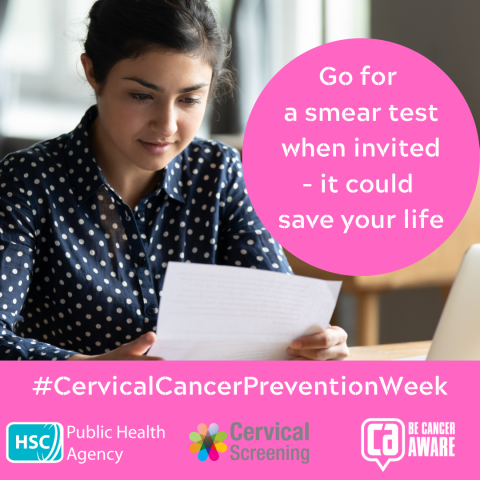Go for smear test when invited – it could save your life

During Cervical Cancer Prevention Week (17-23 January), the Public Health Agency (PHA) is highlighting the importance of women attending for cervical screening when invited.
Statistics show that between 2015 and 2020 in Northern Ireland, there was an average of 83 women diagnosed with cervical cancer each year and around 20 deaths per year.
“It is really important for women to accept their invitation for the screening test – it could save your life,” Dr Tracy Owen, Interim Assistant Director of Public Health - Screening and Professional Standards at the PHA, said.
“Cervical screening aims to prevent cervical cancer from developing. It’s often called a ‘smear test’ and checks the cells from your cervix, the lower part of the womb.
“Screening is designed to pick up any changes to these cells so that they can be monitored or treated. Without treatment, where required, the changes can sometimes develop into cervical cancer.”
In Northern Ireland, screening is offered to women aged 25–64. This is the age group where screening is of most benefit. You will be routinely invited every three years if you are aged 25–49, and every five years if you are 50–64. Invitations are currently running a few months behind schedule, due to the programme being paused in the early stages of the COVID-19 pandemic. However, if you are concerned that you have missed an invitation, or if you have any symptoms, you should talk to your GP.
Many women may feel nervous about going for their screening test, especially if it is their first time. You may be worried about the actual process of having the test, as well as the results. These worries can put some women off attending.
“The test will only take a few minutes and is usually carried out by a nurse,” said Dr Owen.
“This is one of the few cancers that is preventable. It is estimated that in a well-screened population, eight out of ten cervical cancers can be prevented. I would strongly encourage all women, particularly those who have just been invited for screening for the first time, to see it as a positive step in looking after your health.”
If your GP surgery is not able to offer you a screening appointment straight away when you contact them, try calling back in a few weeks. Don’t just wait until your next invitation.
It is also taking a little longer for the labs to report the results of screening tests at the moment, so please be patient. When you attend your appointment, your nurse or doctor should be able to advise when you can expect your result.
The other important way of protecting girls against future cervical cancer is through the human papillomavirus (HPV) vaccine which is offered to all girls and boys in Year 9 in school.
“The HPV vaccine helps protect against two types of the virus that cause most cases of cervical cancer,” said Dr Owen.
“We would recommend all girls and boys receive the vaccine when it is offered to them. Women who have had the vaccine are still advised to attend for cervical screening when they are invited to do so.”
As with all screening programmes, going for a cervical screening test, doesn’t guarantee that you won’t develop cancer in the future, although it will significantly reduce the chance. A cancer could develop between screening tests, or there is a small chance that the test misses some changes to your cervix. Women of any age, who are concerned about symptoms such as abnormal bleeding, or pain or discomfort in the lower pelvis, should seek advice from their GP, even if they attend regularly for screening.
For information about cervical screening, check out this animation from the Women’s Resource and Development Agency www.youtube.com/watch?v=efK7ifyqvHo
Have questions about attending for a smear test because of coronavirus? Check out the FAQs from Jo’s Cervical Cancer Trust www.jostrust.org.uk/information/coronavirus/faqs
For more information about the HPV vaccine please visit www.pha.site/hpvquestions
ENDS
Notes to editors
The HPV vaccine helps protect against two types of the virus that cause 70% of cases of cervical cancer. More info on the HPV vaccine can be found at www.pha.site/hpvquestions
